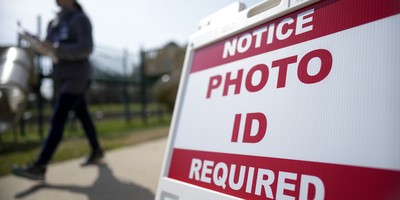We quoted Andy McCarthy extensively in our original post about this revelation earlier in the week, and for good reason: He spent a career prosecuting criminals and working hand-in-glove with the FBI. He's raised serious questions about the Bureau and DOJ's handling of the investigation into Hillary Clinton's national security-endangering and gravely improper email scheme, calling out each anomaly along the way. Now that reports are flying that the feds orchestrated a "side deal" with two top Clinton aides in which they agreed to destroy laptops after reviewing certain contents (more on that in a moment), McCarthy is incredulous. We'll get to his commentary shortly, but first, here's Catherine Herridge's on-air presentation of the newly-discovered facts:
Sources said the arrangement with former Clinton chief of staff Cheryl Mills and ex-campaign staffer Heather Samuelson also limited the search to no later than Jan. 31, 2015. This meant investigators could not review documents for the period after the email server became public -- in turn preventing the bureau from discovering if there was any evidence of obstruction of justice, sources said. The Republican chairman of the House Judiciary Committee fired off a letter Monday to Attorney General Loretta Lynch asking why the DOJ and FBI agreed to the restrictive terms, including that the FBI would destroy the laptops after finishing the search.
Two important details in that clip: First, the FBI agreed not to review digital contents of the laptops that originated after January of 2015. The New York Times first reported the existence of Mrs. Clinton's private server in March of that year. So the government forfeited the opportunity to review any potential evidence of obstruction of justice (from which Mills and Samuelson already had immunity) that occurred after the public learned of Clinton's server. You'll recall that the Times' publication of that story was what prompted an "oh sh*t" moment from a Clinton IT staffer who had been tasked with deleting Hillary's email archive. Second, Herridge relays a good question from "a leading national defense attorney," who noted that once classified information is discovered on a private computer, "that computer is considered government property." If that's the case, why weren't the laptops in question simply seized or subpoenaed by investigators? And why were the owners of those personal computers given generous immunity agreements, especially with parameters about which files could be examined, limited by dates.
Recommended
As a non-attorney, I've been unimpressed with James Comey's answers under tough questioning from former federal prosecutor Trey Gowdy, who seems to present a robust case that intent is provable, given Mrs. Clinton's false exculpatory statements (generally known as lies) after the fact. It's doubly suspicious that Comey has relied so heavily on the "no intent" argument now that we know the FBI agreed not to review evidence that may have confirmed intent once Clinton's email arrangement spilled out into the open. And then permanently destroyed the entire record. Here's McCarthy marveling at these latest permutations:
Sources said the arrangement with former Clinton chief of staff Cheryl Mills and ex-campaign staffer Heather Samuelson also limited the search to no later than Jan. 31, 2015. This meant investigators could not review documents for the period after the email server became public -- in turn preventing the bureau from discovering if there was any evidence of obstruction of justice, sources said. The Republican chairman of the House Judiciary Committee fired off a letter Monday to Attorney General Loretta Lynch asking why the DOJ and FBI agreed to the restrictive terms, including that the FBI would destroy the laptops after finishing the search...[Paul] Combetta was obviously in contact with Mills and other Clinton team members from early February through the end of March 2015 — the period the FBI was barred from examining under the computer side deal. Combetta tells the highly unlikely story that, during this time frame, he destroyed Clinton’s e-mails on his own initiative, without any encouragement from Mills or others in the Clinton camp.
When asked during last week’s House hearing how he could believe Combetta, FBI director Comey pointedly replied that it was not a matter of believing Combetta; the problem was not having evidence that disproved Combetta’s story. So if the FBI was interested in finding such evidence, why would it agree (or at least abide the Justice Department’s agreement) to an arrangement under which it was denied the ability to review documents on Mills’s computer from March 2015, when Combetta, while in frequent communication with Mills, destroyed the e-mails?
And another obvious, sensible question:
Finally (at least until the next shoe drops), why would the FBI agree to destroy the computers after conducting the (apparently highly limited) examination that was agreed to? The Federal Rules of Criminal Procedure explicitly provide (in Rule 41) that, when the government has taken custody of property for investigative purposes, a person who is somehow aggrieved by this deprivation may petition the court for the return of that property. The rule empowers the court to order the return of the property if it is not relevant to an ongoing investigation; and, if the court grants such relief, it “may impose reasonable conditions to protect access to the property and its use in later proceedings.” That is, the law encourages the preservation of materials that may have future investigative relevance.
None of this makes much sense unless viewed through a prism of the Obama Justice Department hamstringing the FBI, refusing to convene a grand jury, and ensuring that everyone who might reasonably end up in trouble was handed an expensive get-out-of-jail-free card. It doesn't take a conspiracy theorist to wonder what exactly was discussed during that infamous tarmac rendezvous.

























Join the conversation as a VIP Member